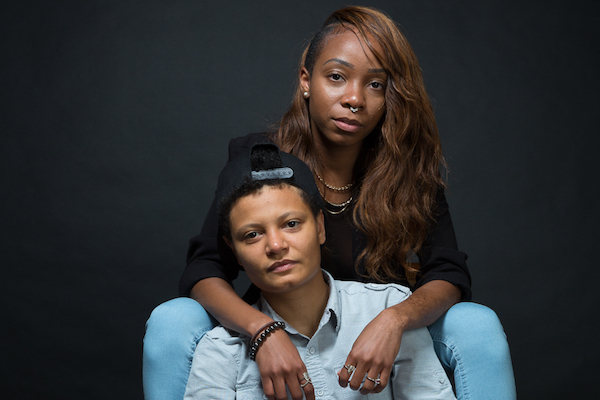Cheyenne Adriano and Mari N’Timansieme were looking for a place where they could be themselves, and still be safe. That simple demand has led them on a journey that has bounced them back and forth across borders and entangled them in immigration bureaucracy for seven years and counting.
Gender-nonconforming from a young age, Mari grew up facing a barrage of abuse in Luanda, Angola. “I’m a target right away,” she says. “I don’t even have to open my mouth, they can just look at me…I couldn’t even leave my house without knowing I could be attacked.” In their time living together, Cheyenne and Mari never felt safe in their home. Neighbors cut their power and killed their dog; police joined in the swarm of street harassment that rose to meet them. The final straw came when one neighbor devoted himself to stalking the couple at all hours, threatening to burn their house down in the night. After years of dodging and withstanding attacks, they knew better than to disregard a threat against their lives.
When the couple first decided to leave Luanda in 2012, homosexual conduct was still criminalized under the country’s colonial penal code. Legal discrimination meant that Cheyenne and Mari bore abuse from family, neighbors, and strangers alike with no institutional support to turn to.
Cheyenne and Mari planned to build a life together in Cape Town. The only country on the continent to legalize same-sex marriage and home to significant anti-discrimination legislation, South Africa is a common destination for African LGBTQ asylum seekers. However, Cheyenne and Mari didn’t find the support they anticipated. The government had shut down Cape Town’s Refugee Reception Office shortly before their arrival, leaving asylum seekers to travel long distances to submit their applications. Unauthorized to work, living in a shelter, and with no discernible progress toward legal status, the couple returned to Luanda after two years and began planning their journey toward a new destination: the United States.
Arriving on student visas, the couple began a long immigration process they are still undergoing. It took them about six months just to get a hearing, another six months to get a work permit. While they waited, they struggled to stay afloat in San Francisco, consistently ranked the most expensive city to live in the U.S., and the one with the country’s widest wealth gap. But navigating the legal system took more than a financial toll. “The bureaucracy of seeking asylum is psychologically challenging,” Mari says. “You go to bed thinking, what if I have to go back? What’s my plan B?”
While heralded as a progressive hub and LGBTQ haven, San Francisco had its ups and downs for Cheyenne and Mari. They found that community didn’t come easy. “In our culture,” Mari explains, “it’s so easy to make friends. In the U.S., it’s different. People are so into that routine of exchange. They will network with you because they want something from you.” They’ve faced extra challenges as a result of their intersecting identities. “In our LGBT community,” Mari says, “there’s still racism, and there’s still xenophobia. We have been discriminated against for being Black, a foreigner. You’ll go to a job interview and when they realize you have an accent, they’ll find a reason not to hire you.” But there have been bright spots, too. In 2015, the couple married, after years of waiting for the chance. They have relocated to Las Vegas, where they work in the tech industry and are recording new songs; Cheyenne writes and sings under her artist name, KingCyborg, while Mari produces the music. And while they still hear comments in the streets, they felt more comfortable being themselves in public. “Whatever else,” says Mari, “that’s freedom.”
Cheyenne and Mari’s story, alongside those of Subhi Nahas from Syria and Junior Mayema from the Democratic Republic of Congo, is featured in the new documentary “Unsettled” from director Tom Shepard. The film follows the four asylum seekers and refugees as they arrive in San Francisco and work to build new lives. Cheyenne hopes the documentary will help audiences understand why people come to the U.S. to seek refuge, the great contributions they bring with them, and what they have to go through once they get here. “We want people to see what the immigration, the asylum process is really like,” she says. Screenings are scheduled across the country and internationally.
In January, the Angolan parliament voted to adopt a new penal code for the first time since the country gained independence in 1975. This code abandons the anti-LGBT provision, and bans discrimation based on sexual orientation. Carlos Fernandes, director of Iris Angola Association (Associação Íris Angola), says that it remains to be seen how it will be put into practice.
The first and only LGBTQ rights organization to be officially registered with the Angolan government, Iris Angola works in the areas of health, LGBTQ support and empowerment, and community education. Part of the problem, Fernandes says, is that “many people in this area don’t know what it is to be LGBT.” Even when knowledge is higher, people may be more tolerant in public, but “everything changes when you are at home. We face various problems as a result of the family. They are the first to discriminate against LGBT people in Angola.”
Mari describes the legislation as “definite progress.” “Right now,” she says, “LGBT people know there is a community where they can go for guidance and support…but it’s still not going to change society’s mindset. It takes decades—maybe centuries—to do that.”
UNSETTLED Trailer from Tom Shepard on Vimeo.


